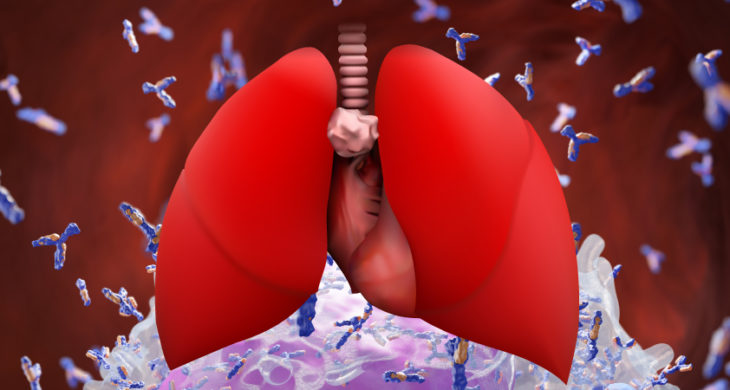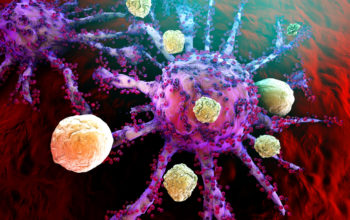
Date: 22nd February 2022
Lung transplantation is a life-saving therapy for end-stage lung diseases however, finding suitable donor organs that display immunologically compatible antigens is essential. For certain blood types waiting times for a suitable match can be much longer than for others, leading to increased mortality rates. Now, researchers have used two enzymes to convert blood group A lungs to blood group O lungs, creating a ‘universal’ blood type organ for transplant.
Blood type is determined by the presence of antigens on the surface of red blood cells — type A blood has the A antigen, B the B antigen, AB blood has both antigens and O has none. Antigens can trigger an immune response if they are not recognised by our immune systems as self, and as type O blood does has not have any antigens it is considered a ‘universal’ donor type. In converse though, this means a that a person with type O blood has both anti-A and anti-B antibodies in their blood stream, subsequently they can only received organs from a type O donor. This means that type O patients wait twice as long to receive a lung transplant compared to patients who are type A for example. Having universal organs available to all blood types would be highly desirable and would mean the elimination of the blood-matching barrier. This would allow medics to prioritise patients by medical urgency, saving more lives and would decrease wastage of organs.
Now, researchers at the University of Toronto, the Latner Thoracic Surgery Research Laboratories and University Health Network ‘s Ajmera Transplant Centre, Canada, led by Marcelo Cypel, have used the enzymes FpGalNAc deacetylase and FpGalactosaminidase to remove A antigen (A-Ag) from human donor lungs using ex vivo lung perfusion (EVLP) converting them to a universal group O.
The team used a group of enzymes that they had previously found in the human gut which can cut sugars from the A and B antigens on red blood cells (RBC), converting them into universal type O cells.
To start they tested the ability of the enzymes to remove A-Ag in organ perfusate solutions in 5 human RBC samples and 3 human aortae after static incubation. They found >99% of antigen was removed from RBCs whilst ~90% was removed from the aortae.
Next they tested the ability to remove A-Ag from 8 human donor type A lungs, deemed unsuitable for transplant, using ex vivo perfusion. Lungs from the same donor were separated to two distinct EVLP circuits. The control cohort received standard EVLP (a clinical technique that is now used routinely for lung preservation, assessment, and treatment) and the other group received EVLP together with the enzymes. Within the first hour a marked vascular clearance of A-Ag was observed, and they found >97% of endothelial A-Ag was removed within 4 hours.
Then to assess suitability for transplant the treated lungs host circulation was simulated by reperfusing the lungs with type O plasma, that contained both anti-A and anti-B antibodies. Antibody-mediated injuries were assessed on the basis of changes in circulating anti-A antibodies, tissue-bound antibodies, complement, inflammatory cytokines, lung physiology, and lung histology. In the control lungs the influx of circulating anti-A Ab was rapidly depleted as they adsorbed on to the lungs surface, the group treated with enzymes however remained stable over the course of reperfusion. In the treated lungs no acute side effects were observed in lung physiology, and there were no changes in inflammatory cytokine, suggesting lungs could tolerate the perfusion well. In contrast, the control lungs exhibited high levels of cytokine induction.
Conclusions and future applications
The team here have devised a proof-of-concept strategy to overcome compatibility requirement in lung transplantations. By converting A-Ag of donor lungs into type O organs they have created a method to create ‘universal’ organs. This will significantly improve fairness and waste in organ allocation, and will decrease mortality rates for patients especially with type O blood.
The team will over the next 12-18 months be working towards clinical trials for their enzyme EVLP method. They do however note that they currently lack information on antigen re-expression and do not yet have post-transplantation data. They plan on using transgenic mice which express A-Ag on endothelium to address these questions.
This is an important milestone in the drive towards creating universal blood-type organs for transplant, and work here will likely transfer to other organs. Whilst, the method here will help utilise current donor organs in the most efficient manner it won’t solve the lack of organs per se, the severe shortage of donor organs is also being addressed in other ways. Genetically modified pig hearts and pig kidneys have recently been transplanted into humans successfully however, for some this may stretch their ethics and raise worries about cross species contamination. An alternative solution is to create artificial organs, although many inroads are being made in this respect such as the building of a biohybrid fish using heart stem cells with the aim of understanding muscular pumps, or the development of artificial paediatric heart valves that grow with the patient, these approaches a notoriously challenging due the complexity in physiology and function of whole human organs. However, albeit it early days, researchers are finding a wide range of innovative solutions to this crisis and are hoping to save thousands of lives and improve patients life quality.
For more information please see the press release at University Health Network
Wang, A., Ribeiro, R.V.P., Ali, A., Brambate, E., Abdelnour-Berchtold, E., Michaelsen, V., Zhang, Y., Rahfeld, P., Moon, H., Gokhale, H., et al. (2022). Ex vivo enzymatic treatment converts blood type A donor lungs into universal blood type lungs. Science Translational Medicine 14, eabm7190.
https://doi.org/10.1126/scitranslmed.abm7190
http://eha.3a7.mywebsitetransfer.com/worlds-first-genetically-modified-pig-heart-transplanted-adult-human/
http://eha.3a7.mywebsitetransfer.com/worlds-first-clinical-grade-transplant-of-gene-edited-pig-kidneys-into-humans/
http://eha.3a7.mywebsitetransfer.com/biohybrid-fish-swim-towards-building-an-artificial-heart/
http://eha.3a7.mywebsitetransfer.com/artificial-paediatric-heart-valves-grow-patient/

